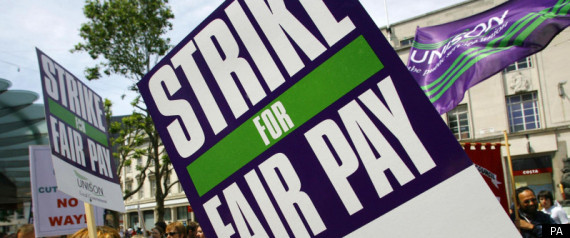 Britain could be poised for a series of nation-wide strikes on November 30, as unions announced plans to ballot their members on industrial action over changes to public sector pensions.
Britain could be poised for a series of nation-wide strikes on November 30, as unions announced plans to ballot their members on industrial action over changes to public sector pensions.The walkouts are in protest at government proposals to increase pension contributions by 3.2 per cent.
Brendan Barber, head of the Trade Union Congress (TUC) said it remained committed to negotiations but warned of further action beyond a November 30 strike if "if progress towards a settlement is not secured".
“We remain absolutely committed, in good faith, to seeking a fair negotiated settlement of this dispute so that this action will not be necessary. But the government needs to understand the strength of unions’ resolve reflected in today’s decision.”
Ministers have warned that the cost of public pensions is becoming unaffordable. But the unions believe the coalition is targeting public sector pay for ideological reasons.
On Wednesday, Unison, Britain's biggest public sector trade union, gave formal notice to 9,000 employers that its 1.1 million members would be balloted for industrial action.
Unison's general secretary, Dave Prentis, told delegates at the TUC conference in London that the action would be on an "unprecedented in scale".
"It's a decision we don't take lightly and the stakes are high, higher than ever before, but now is the time to make our stand. It will be hard, we'll be vilified, attacked, set against each other, but we must stay strong and united," he said.
Britain's two other largest unions, GMB and Unite, have also announced plans to ballot their members, as has the Fire Brigades Union.
If it goes ahead, the action would be the biggest since the 1926 general strike staged over the working conditions of miners.
Brian Strutton, the GMB's national secretary for public services, said the strikes would see vital public sector workers including paramedics and care workers out on the picket line.
"Its not nice little neat comfortable bits of action we are talking about ... those public sector workers politicians are happy to vilify most of the time will suddenly become essential," he said.
The Public And Commercial Services Union (PCS), which represents civil servants, is expected to stage walkouts in support of the strike.
PCS general secretary Mark Serwotka said the government was attempting to launch a "raid on public sector pensions and an 'assault' on jobs, pay and public services".
"Following the hugely successful strike by civil servants, teachers and lecturers in June, there is a clear momentum behind our campaign that ministers cannot ignore or dismiss, and they must now enter into serious and open negotiations," he said.
"We have always said that the more united we are, the harder it will be for the government to push through their ideologically-driven and damaging cuts."
Christine Blower, General Secretary of the National Union of Teachers (NUT) told the TUC conference that her union would support the strikes.
"Enough enough, united we can win, these are our pensions they are fair we must stand together, we must defend them," she said.
Cabinet Office minister Francis Maude, who is leading the negotiations with the unions, said there would be very little public sympathy for strike action.
"We don't want strikes and the public will be very fed up if there are widespread strikes which close schools and affect health services and transport," he said.
"People who are struggling to pay their bills and paying more towards public sector pensions in many cases than they are paying towards their own pensions will be mightily fed up if there is unnecessary strike action."
On Tuesday Labour leader Ed Miliband was heckled by union members when he refused to endorse plans to take industrial action.
"Strikes are always the consequence of failure. Failure on all sides. Failure we cannot afford as a nation. Instead your real role is as partners in the new economy," he said.
And Labour's shadow work and pensions secretary, Liam Byrne, said the reforms to public sector pensions begun under the previous government needed to be built upon and urged both sides to negotiate fairly.
"The deal that is done has got to be a deal that is fair. The government have got to engage with his seriously," he said. "Equally from the union side, there has got to be a determination to negotiate too."
Origin
Source: Huffington
No comments:
Post a Comment